Belt and Road
Your Present Location: PROGRAMS> Belt and RoadThe first BRI Global Mentor Project launches in Beijing
On May 29th, guided by Silk Road Think Tank Association (SRTA), hosted by Renmin University of China (RUC), and co-organized by Silk Road School and Chongyang Institute for Financial Studies at Renmin University of China(RDCY), the launching ceremony of the first Belt and Road Initiative (BRI) Global Mentor Project as well as the Symposium themed on “Cultivating Global Talents: Progress, Potentials and Suggestions for Studying in China in the Past 70 years” was held in RDCY. This conference aims to leverage intelligence and organization advantages of education research institute, fully maximizes global network resources of renowned international think tanks represented by RDCY, proactively explores the whole new educational connectivity pattern of BRI so that joint education of BRI can be implemented.
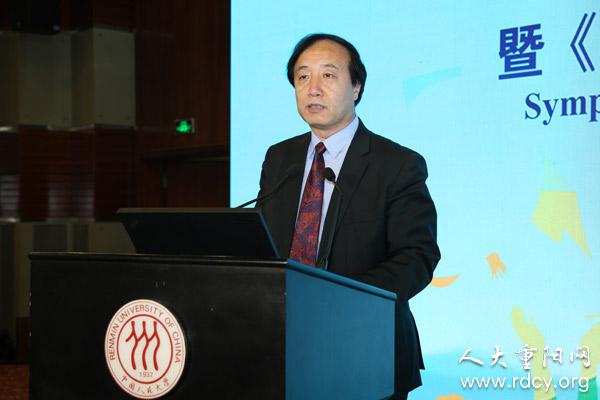
Du Peng, Vice President of RUC and Dean of Silk Road School at RUC; Djoomart Otorbaev, Former Prime Minister of Kyrgyzstan, Non-Resident Senior Fellow of RDCY; Zhang Yanling, Former Vice President of Bank of China, Vice Chair of Silk Road Council of International Chamber and Senior Fellow of RDCY; Bruno Maçães, Former Minister for Europe Affairs in the Portuguese government, Non-resident Senior Fellow of RDCY; Yüksel Görmez, Senior Economist, Central Bank of Turkey, Non-Resident Senior Fellow of RDCY; Wu Sike, Former China's Special Envoy on the Middle East Issue, Senior Fellow of RDCY; Mao Dongming, Director of Department of International Cooperation and Exchangesat Ministry of Education and other persons, attended the conference. Wang Wen, Executive Dean of RDCY, Deputy Dean of Silk Road School at RUC, hosted the opening ceremony.
Du Peng made an introduction to Silk Road School established in April, 2018. As the first college awarded degrees among Chinese universities to implement the BRI, the school provides learning opportunities and builds a platform for friends from countries and regions along the Belt and Road who love Chinese culture, Chinese language and China's development path. He said, "the launching ceremony of the BRI global mentor Program at RUC is an important step forward for the Silk Road School to make innovation in running. I believe that the model of education connectivity and think tank network can cultivate more high-quality interdisciplinary talents for BRI construction."
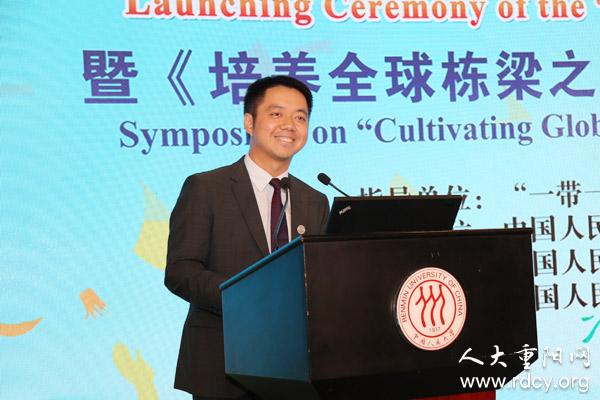
Wang wen pointed out that under the support of the Ministry of Education, the project of the Silk Road School coordinate by RDCY, the School of International Studies and the Suzhou campus, was successfully prepared in a very short period. A total of 336 applicants from 72 countries applied in 2018, and 72 of them were selected.
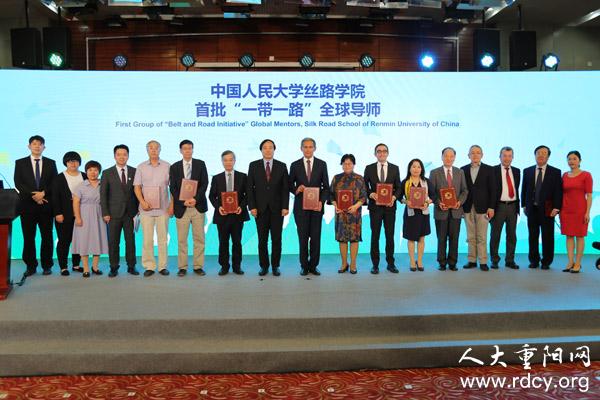
Subsequently, at the launching ceremony, Vice President Du Peng presented the “BRI Global Mentor of Silk Road School at Renmin University of China” Certificate to the 11 international experts from political and academic circles including Djoomart Otorbaev and Zhang Yanling.
Global mentor program can make full use of the resources platforms of RUC and RDCY, creatively carry out cooperation with political and business elites, experts and scholars enjoying a good reputation both at home and abroad, build bridge between the elite from all walks of life and good students. It also fully embodies the system and mechanism innovation of RUC and educational internationalization advantage, also gives the students a chance to deeply understand the BRI, China's development path, mode and experiences.
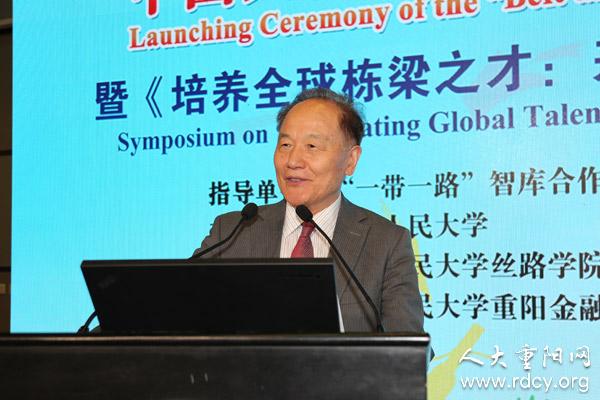
Wu Sike delivered a speech as a representative of the mentors. He noted that BRI adheres to the principle of extensive consultation and joint contribution based on shared benefits, focuses on the development of countries along the route and beyond, and benefits the global people from a wider field. This grand blueprint needs the efforts of a generation, and the cultivation of talents is the fundamental guarantee for the realization of the great vision.
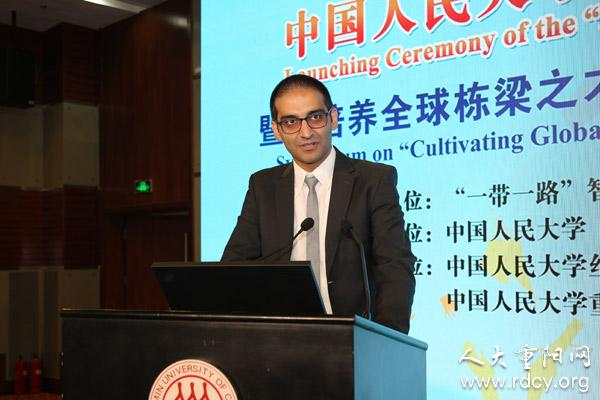
KAMYABI MASK Aflatoun, a student from the Silk Road School, spoke on behalf of the students. He said that the BRI is not only about trade, infrastructure and investment, but also promoting cultural and educational exchanges. In his speech, he thanked the implementation of the global mentor project, saying it was a valuable opportunity for students.
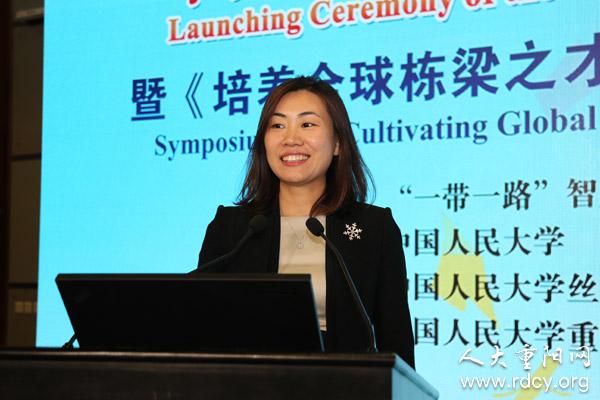
Mao Dongmin spoke as an official representative. She said that the Silk Road School has adopted the model of "education + think tank". It would forge ahead by taking advantage of opportunities. At the end of her speech, she also said to the students, "I hope you can grow into pillars of your national development and become a friendly bond between China and other countries."
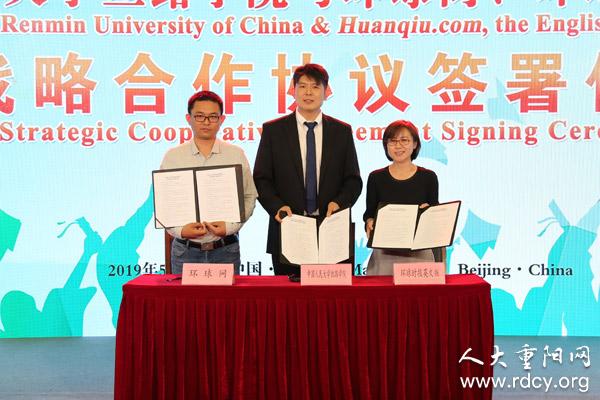
Zhu Wentan, assistant editor-in-chief of the Huanqiu.com, and Huang Lei, deputy editor-in-chief of the Global Times, and Lyu Jie, deputy dean of the Silk Road School later signed a strategic cooperation agreement as representatives of the two sides. The two sides will carry out in-depth cooperation in the next three years from the perspectives of the cultivation of students' ability, BRI communication and research, and reporting on major international issues.
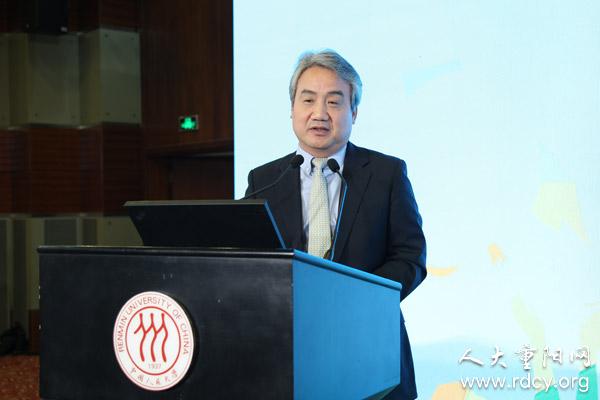
Shan Chengbiao, general manager of the Huanqiu Network portal, said in his speech that as an international website, it has been committed to telling the Chinese story and spreading the Chinese voice. “I am very pleased to use the power of our media to provide students of the Silk Road School with a window to observe China closely and understand China deeply," said Huang Lei.
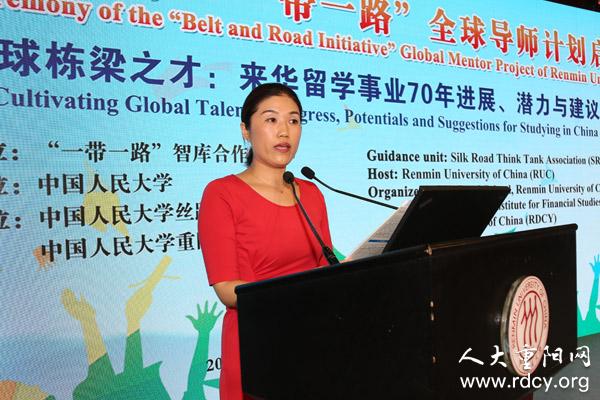
Yang Qingqing, the assistant dean of RDCY as well as assistant dean of the Silk Road School, issued a research report. This report reviews the progress and characteristics of international students in China since the founding of China 70 years ago. Through many data and examples, it explores the current experiences and opportunities and puts forward feasible suggestions. According to the report, China is undergoing a period of changes rarely seen in the past century. China needs to strengthen the work of international talents coming to China to study, systematical and sustainable cultivation of overseas talent of education high quality, exert a subtle influence on improving their rational cognitive and affective commitment to China, steadily meet the demand of era and serve the BRI construction and the common development, which is the purpose of the Silk Road School construction, as well as the current focus of concern.
Wang then highlighted several figures in the report. First, there are now more than 1,000 universities in China that accept foreign students. Second, since 2016, China has become the world's second largest destination for international students, surpassing Japan and South Korea and become the first destination to attract foreign students in Asia. Third, in the past six years, 23 percent of the international students enrolled in China who came from developed countries and 77 percent from developing countries.
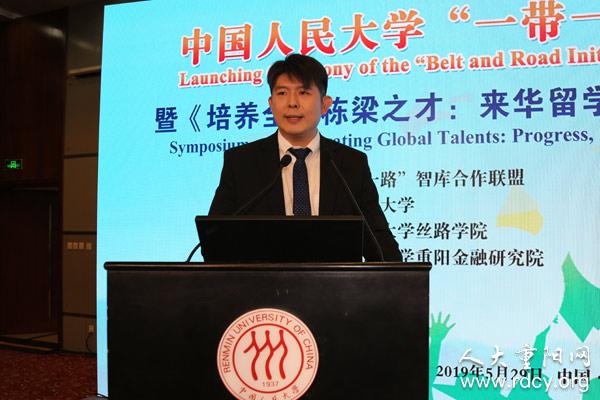
Then, Djoomart Otorbaev, Zhang Yanling, Bruno Maçães, and Yüksel Görmez delivered keynote speeches, and Lyu Jie presided over the session.
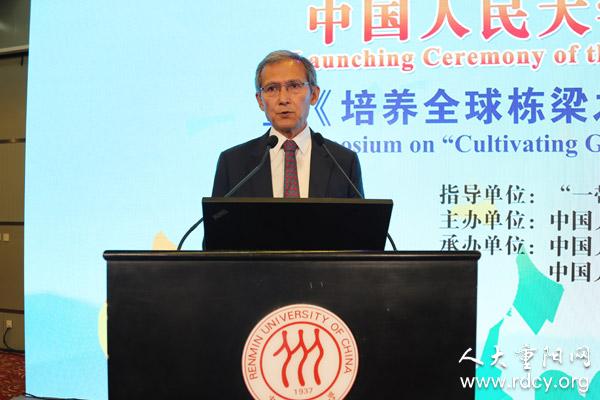
Djoomart Otorbaev talks about the importance of talent development and technology development by quoting a case of Huawei that is being sanctioned by the United States. He suggested that China should launch more projects and train more talents.
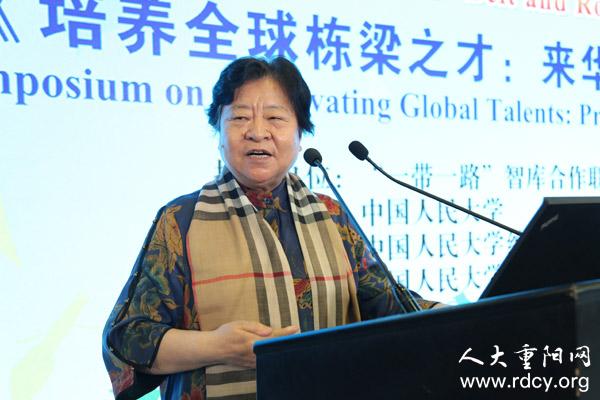
Zhang yanling's speech focused on the design of systematic education of Silk Road School. She puts forward several Suggestions: first, people should be forward-looking, and the courses should stand the test of history. Second, we should pay attention to brand building. Third, we should give full play to the advantages of students from all over the country to carry out targeted research on national economic development. Fourth, we should lay emphasis on the connotative development and concentrate on the research and studies equally.
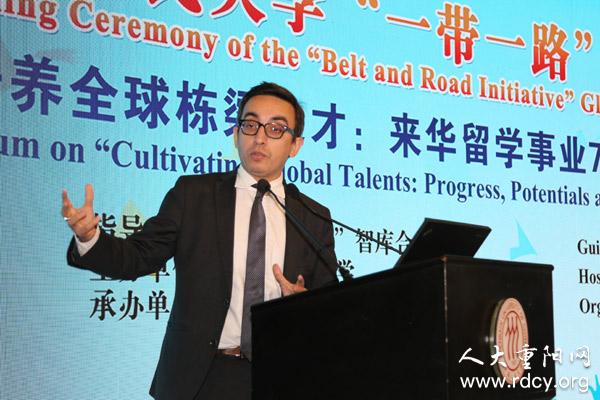
Bruno Maçães starts with his Harvard experience, arguing that a program's impact is long-term, and a pool of talent can be a world-changing force. He said that the opening of the Silk Road School at Renmin university of China is a key practice of BRI people-to-people exchanges, which can promote better understanding between China and the world.
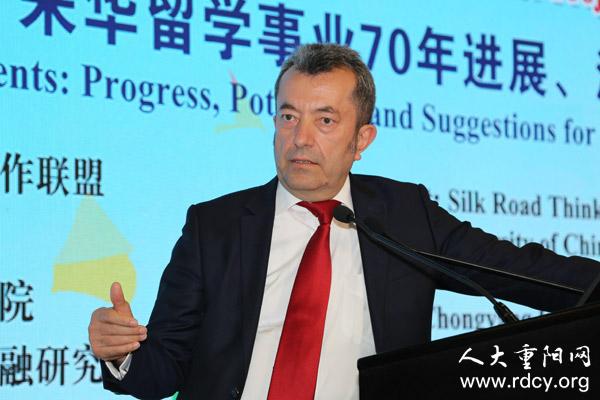
In his speech, Yüksel Görmez pointed out that talents are of great significance to the development of the country's economy and the progress of science and technology. He said talent innovation increases productivity and future productivity growth, which can generate more tax revenue and support a strong national currency.
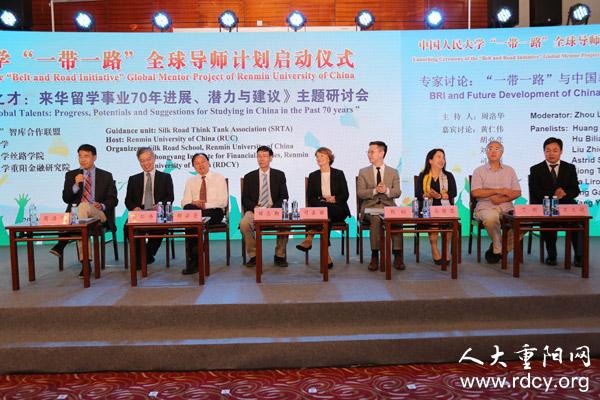
At last, hosted by associate dean of RDCY Zhou Luohua, several experts and scholars including Huang Renwei, Executive Vice Dean of Fudan Institute of Belt and Road & Global Governance, Hu Biliang, Executive Dean of the Belt and Road School of Beijng Normal University, Liu Zhiqin, Senior Fellow of RDCY, Xiong Tao, Vice President for International Development of BGI, Ma Lirong, Director of Institute of Silk Road Strategy Studies at Shanghai International Studies University, Ding Gang, Senior Adviser to the Global Times, and Wang Yiwei, Professor of School of International Studies, conducted a panel discussion on the topic of " BRI and Future Development of China's Education". They reviewed the development history of studying in China in the past 70 years, talked about the potential of future development, and put forward suggestions for future development.
Other guests attending the meeting included experts from RUC and RDCY, as well as student representatives of Silk Road School from Russia, France, Turkey, Denmark, India and Iran.
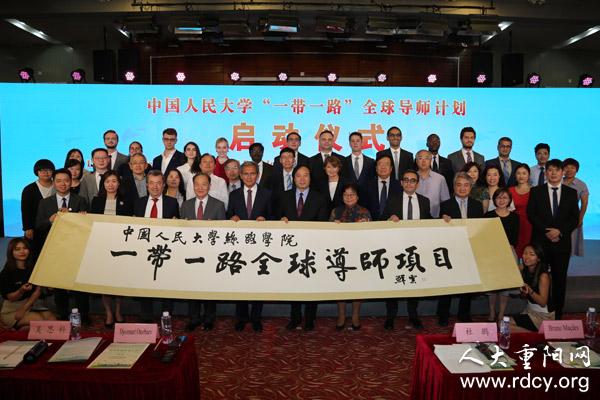
In 2019, according to organizers, except for the Chinese students, a total of 541 people from 73 countries applied to study in the Silk Road School. The registration number increases by 61% than last year, attracting more and more students from developed countries, including the United States, France, Denmark and Austria. The trend of studying in China among countries along the BRI continues to ascend. In the future, the school will play a greater role in international cooperation and exchanges in various aspects, including policy alignment, academic research, project construction and people-to-people exchanges, and make greater contribution to the steady and long-term development of the joint building on the BRI.























































































 京公网安备 11010802037854号
京公网安备 11010802037854号





